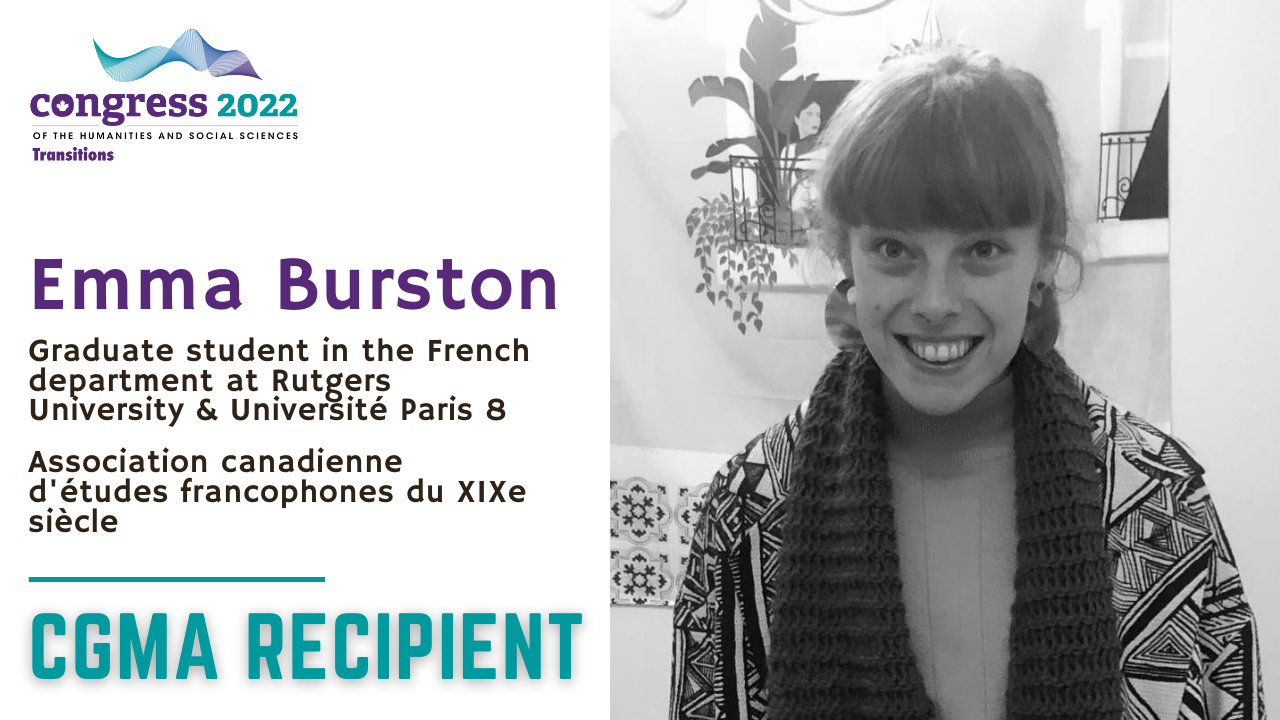Nominated by member scholarly associations of the Federation for the Humanities and Social Sciences, the 2022 Congress Graduate Merit Awards recognize exceptional graduate students who will be presenting their work at the Congress of the Humanities and Social Sciences.

Tell us about yourself.
My name is Emma Burston, I am a graduate student in the French department at Rutgers University & Université Paris 8 – finishing a cotutelle doctoral dissertation entitled “La nouvelle au XIXème siècle: entre fixité et mouvement”. My primary research interests include 19th-century French literature (especially short stories, the “nouvelle” and the “conte”), visual culture (forms of immersive spectacle such as Daguerre’s diorama) and eco-criticism. I am excited to begin a position teaching French at the College of the Holy Cross in August 2022.
List the scholarly association(s) of which you are currently a member.
I am a member of ACÉF-XIX, NCFS (Nineteenth-Century French Studies), INCS (Interdisciplinary Nineteenth-Century Studies), NCSA (Nineteenth-Century Studies Association) and SDN (the Society of Dix-Neuviémistes).
At which conference(s) will you be presenting and/or attending?
I will be presenting at the ACÉF-XIX conference.
What is the title of your Congress 2022 presentation?
« Le passage impossible : Maupassant et la hantise de l’auberge » (The impossible passage : Maupassant’s fear of the auberge)
How would you describe the research you will be presenting at Congress 2022?
My presentation will show how the transitory space of the inn, in the context of three of Guy de Maupassant’s short stories “L’Auberge”, “Boule de Suif” and “Les Sœurs Rondoli”, serves as a space of entrapment, keeping fictional guests from arriving at their destination, forcing them to stagnate within this liminal space. I hope to show how the 19th century’s fascination with speed and the constant acceleration of daily life are challenged by these strange scenes of (inn)hospitality, where guests become cellmates as they await their chance to leave.
How does the research you will be presenting connect with the Congress 2022 theme, Transitions?
The notion of transition is central to my research on Maupassant whose short stories, by prolonging the duration of transitory states (like the stay in a hotel or an inn), create uncomfortable scenes of cohabitation. The inn, commonly thought of as a place one can “stop” to transition between one place and another, between home and community, or in the context of Maupassant’s oeuvre, between the “hors” and the “là”, becomes a prison where hotel guests slowly become (inn)mates. It is Maupassant’s refusal of change or advancement, his very denial of transition, which allows me to connect my research on this author to the Congess 2022 theme, Transitions.
Share your hopes for Congress 2022.
I look forward to presenting my work on Maupassant, of course, but I am especially curious about the presentations my fellow colleagues will be giving on our panel “Les Lieux Claustrophobes au XIXe siècle” (Atelier 4) comprised of scholars of Maupassant, Jules Verne, and Stendhal, as well as academics from across the Globe, including China and Japan. I am also very excited about the video presentation format which will allow me to preview their fascinating work.
